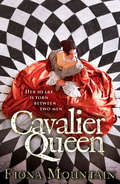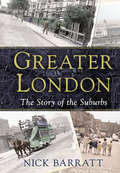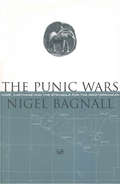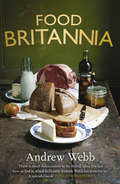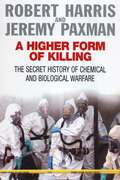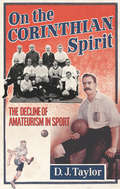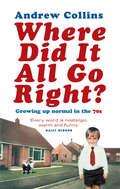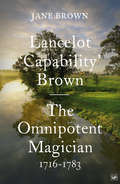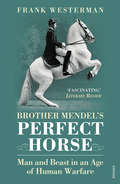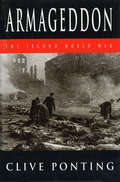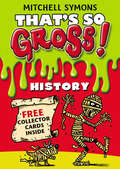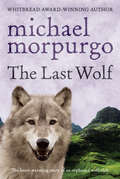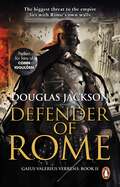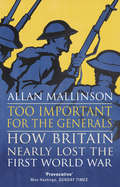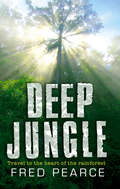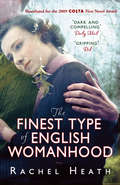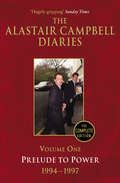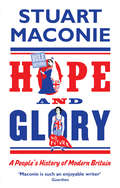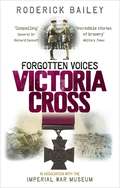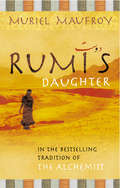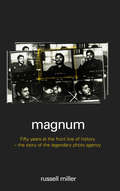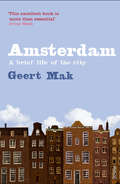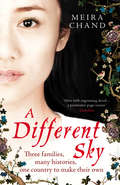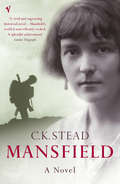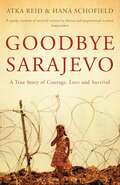- Table View
- List View
Cavalier Queen
by Fiona Mountain______________________She was the Princess Diana of her day.She loved clothes and jewels and parties. She had exquisite taste in interior design. She seemed destined to reign as one of England's most glamorous queens, famed for the beautiful palaces she designed and decorated.Instead, Princess Henrietta Maria of France became caught up in the Civil War, one of the greatest cataclysms in English history. Swept from her life of luxury into the squalid brutality of battle and the loneliness of exile, her heart was torn by the two men she loved - her husband, tragic Charles I and charismatic Harry Jermyn, who designed and built most of London's West End, including the street which bears his name. This is their story.
Greater London: The Story of the Suburbs
by Nick BarrattLondon's suburbs may stretch for well over 600 square miles, but in historical accounts of the capital they tend to take something of a back seat. In Greater London, historian Nick Barratt places them firmly centre stage, tracing their journey from hamlets and villages far out in the open countryside to fully fledged urban enclaves, simultaneously demonstrating the crucial role they have played in the creation of today's metropolis.Starting in the first century AD, he shows how the tiny settlements that grew up in the Thames Valley gradually developed, and how they were shaped by their proximity to the city. He describes the spread of the first suburbs beyond the city walls, and traces the ebb and flow of population as people moved in to find jobs or away to escape London's noise and bustle. He charts the transformation wrought by the coming of the railways, the fight to preserve Hampstead Heath, Epping Forest and other green spaces and the struggle to create a London-wide form of government. He gives an account of wartime destruction and peacetime reconstruction, and then brings the story to the present with a description of the very varied nature of today's suburbs and their inhabitants. In the process, he evokes Tudor Hackney and Georgian Hampton, explains why Victorian Battersea and Finchley were so different from one another, and follows Islington's fall from grace and subsequent recovery.Magnificently illustrated throughout with contemporary engravings and photographs, this is the essential history for anyone who has ever lived in London.
The Punic Wars: Rome, Carthage and the Struggle for the Mediterranean
by Nigel BagnallThe Punic Wars (264-146BC) sprang from a mighty power struggle between two ancient civilisations - the trading empire of Carthage and the military confedoration of Rome. It was a period of astonishing human misfortune, lasting over a period of 118 years and resulting in the radical depletion of Rome's population and resources and the complete annihilation of Carthage. All this took place more than 2,000 years ago, yet, as Nigel Bagnall's comprehensive history demonstrates, the ancient conflict is remarkable for its contemporary revelance.
Food Britannia
by Andrew WebbBritish food has not traditionally been regarded as one of the world's great cuisines, and yet Stilton cheese, Scottish raspberries, Goosnargh duck and Welsh lamb are internationally renowned and celebrated. And then there are all those dishes and recipes that inspire passionate loyalty among the initiated: Whitby lemon buns and banoffi pie, for example; pan haggerty and Henderson's relish. All are as integral a part of the country's landscape as green fields, rolling hills and rocky coastline. In Food Britannia, Andrew Webb travels the country to bring together a treasury of regional dishes, traditional recipes, outstanding ingredients and heroic local producers. He investigates the history of saffron farming in the UK, tastes the first whisky to be produced in Wales for one hundred years, and tracks down the New Forest's foremost expert on wild mushrooms. And along the way, he uncovers some historical surprises about our national cuisine. Did you know, for example, that the method for making clotted cream, that stalwart of the cream tea, was probably introduced from the Middle East? Or that our very own fish and chips may have started life as a Jewish-Portuguese dish? Or that Alfred Bird invented his famous custard powder because his wife couldn't eat eggs?The result is a rich and kaleidoscopic survey of a remarkably vibrant food scene, steeped in history but full of fresh ideas for the future: proof, if proof were needed, that British food has come of age.
A Higher Form of Killing
by Robert Harris Jeremy PaxmanThe secret story of chemical and biological warfare.A Higher Form of Killing was first published to great acclaim in 1982. The authors have written a new Introduction and a new Epilogue to take account of the events that have happened since the early 1980s - including the break-up of the former Soviet Union and the black market that appeared in chemical and biological weapons, the acquisition of these weapons by various Third World states, the attempts of various countries like Iraq to build up arsenals of these weapons and, most recently, the use of these weapons in terrorist attacks. As the authors point out, the two generations since the Second World War lived with the threat of nuclear annihilation. Now a new generation must learn to live with weapons that are more insidious and potentially more devastating.
On The Corinthian Spirit: The Decline of Amateurism in Sport
by D J TaylorIn January 1929, before 20,000 spectators, Norwich City of the Third Division South went down 0-5 in the third round of the FA Cup to an amateur side composed of ex-public school boys who disdained professional tactics in favour of instinct and teamwork. Within a decade, the Corinthians, the club that for forty years had supplied the entire English national side, had all but ceased to exist. The world was changing. By the time of the last 'Gentleman vs. Players' cricket match in 1962 a whole era in English sport had come to an end.But the passing of amateur sportsmen - footballers, cricketers, golfers, tennis players - had implications beyond the playing field. A century ago 'amateur' was a compliment to someone who played a game simply for love of it. A hundred years later it is a byword for cack-handed incompetence. In this brilliant study of the patterns of sporting and cultural life, D J Taylor examines the process that led to professionalism's triumph and the long rearguard action fought by sportsmen - and literature - on amateurism's behalf.On the Corinthian Spirit has many heroes - from 'Charlie Bam', the legendary Corinthian defender, who once played a game with a broken leg, to the boys' school story hero Strickland of the Sixth, Old Etonian cricket-lover George Orwell and the 14th Norwich Cub Scout XI of the early 1970s. Drawing on his own experiences of 'amateurism', D J Taylor describes a changing moral universe with profound consequences both for sport and the world beyond it.
Where Did It All Go Right?: Growing Up Normal in the 70s
by Andrew CollinsAndrew Collins was born 37 years ago in Northampton. His parents never split up, in fact they rarely exchanged a cross word. No-one abused him. Nobody died. He got on well with his brother and sister and none of his friends drowned in a canal. He has never stayed overnight in a hospital and has no emotional scars from his upbringing, except a slight lingering resentment that Anita Barker once mocked the stabilisers on his bike. Where Did It All Go Right? is a jealous memoir written by someone who occasionally wishes life had dealt him a few more juicy marketable blows. The author delves back into his first 18 years in search of something - anything - that might have left him deeply and irreparably damaged. With tales of bikes, telly, sweets, good health, domestic harmony and happy holidays, Andrew aims to bring a little hope to all those out there living with the emotional after-effects of a really nice childhood. Andrew Collins kept a diary from the age of five, so he really can remember what he had for tea everyday and what he did at school, excerpts from his diary run throughout the book and it is this detail which makes his story so compelling.
Lancelot 'Capability' Brown, 1716-1783: The Omnipotent Magician
by Jane BrownLancelot Brown changed the face of eighteenth-century England, designing country estates and mansions, moving hills and making flowing lakes and serpentine rivers, a magical world of green. This English landscape style spread across Europe and the world. At home, it proved so pleasing that Brown's influence spread into the lowland landscape at large, and into landscape painting. He stands behind our vision, and fantasy, of rural England. In this vivid, lively biography, based on detailed research, Jane Brown paints an unforgettable picture of the man, his work, his happy domestic life, and his crowded world. She follows the life of the jovial yet elusive Mr Brown, from his childhood and apprenticeship in rural Northumberland, through his formative years at Stowe, the most famous garden of the day. His innovative ideas, and his affable and generous nature, led to a meteoric rise to a Royal Appointment in 1764 and his clients and friends ranged from statesmen like the elder Pitt to artists and actors like David Garrick. Riding constantly across England, Brown never ceased working until he collapsed and died in February 1783 after visiting one of his oldest clients. He was a practical man but also a visionary, always willing to try something new. As this beautifully illustrated biography shows, Brown filled England with enchantment - follies, cascades, lakes, bridges, ornaments, monuments, meadows and woods - creating views that still delight us today.
Brother Mendel's Perfect Horse: Man and beast in an age of human warfare
by Frank Westerman' "When you touch a Lipizzaner, you're touching history," Westerman was once told. His elegant book offers fascinating proof' Financial Times Frank Westerman explores the history of Lipizzaners, an extraordinary troop of pedigree horses bred as personal mounts for the Emperor of Austria-Hungary. Following the bloodlines of the stud book, he reconstructs the story of four generations of imperial steed as they survive the fall of the Habsburg Empire, two world wars and the insane breeding experiments conducted under Hitler, Stalin and Ceausescu. But what begins as a fairytale becomes a chronicle of the quest for racial purity. Carrying the reader across Europe, from imperial stables and stud farms to the controversial gene labs of today, Westerman asks, if animal breeders are so good at genetic engineering, why do attempts to perfect the human strain always end in tragedy?
Armageddon
by Clive PontingFifty years after the end of World War II Clive Ponting provides a major reassessment of the most destructive conflict in human history - one in which 85 million people died.Armageddon avoids conventional chronological accounts in order to concentrate on the deeper forces shaping the origins, course and outcome of the war across the globe. It analyses how and why the war spread from being a limited European conflict to the only global war, why countries were dragged into the fighting and how only a small number of neutral states escaped. It compares the two alliances, how they mobilized their resources and their strategies for victory. It avoids a detailed description of how commanders maneuvered on the battlefield and concentrates instead on the impact the war had on individual soldiers, sailors and airmen. Equally important is the fate of hundreds of millions of civilians. How did they survive occupation and what did resistance, collaboration and liberation really involve, and what happened at the end of the war?Armageddon has a truly global sweep, combined with an eye for detail, and provides fascinating comparisons from a multi-faceted war. It contains new facts, asks provocative questions and challenges many of the common assumptions about the war. It is a compelling new inquiry.
That's So Gross!: History (That's So Gross! #3)
by Mitchell SymonsFRIGHTFUL FACTS AND GORY STORIES . . .Top trivia about life in the past such as:Did Vikings wear horns on their helmets?How did Ancient Egyptians make their mummies?Which animals were gladiators forced to fight?
The Last Wolf
by Michael MorpurgoMichael Morpurgo has created a sweeping and dramatic story in the time of Bonnie Prince Charlie. This spellbinding tale is complemented perfectly by Michael Foreman's illustrations.Robbie McLeod and a wolf cub, both orphaned, venture far from their birthplace, a land of rebellious fighters and vicious redcoats. There is little constancy in Robbie's adventurous life, save for the companionship of his wolf. But when at last Robbie finds a place where he can peacefully make his home, he knows in his heart that the wolf must find his own natural home too . . .
Defender of Rome: (Gaius Valerius Verrens 2): A heart-stopping and gripping novel of Roman adventure (Gaius Valerius Verrens #2)
by Douglas JacksonThis riveting and action-packed historical thriller from bestselling author Douglas Jackson is real edge of your seat stuff! Perfect for fans of Simon Scarrow and Ben Kane.Readers are loving Gaius Valerius Verrens! "Absolutely incredible." - 5 STARS."Gripping, violent and captivating." - 5 STARS."The best Roman historical series I've yet read. Just pips Ben Kane and Conn Iggulden." - 5 STARS **************************************************************Gaius Valerius Verrens returns to Rome from the successful campaign against Boudicca in Britain. But he is not the man he once was - scarred both physically and emotionally by the battles he has fought. And neither is Rome the same city as the one he left.The Emperor Nero grows increasingly paranoid. There is talk of a new threat, one found within the walls of Rome itself. A new religious sect, the followers of Christus, deny Nero's divinity and are rumoured to be spreading sedition.Nero calls on Valerius to seek out this rebel sect and to capture their leader. Failure would be to forfeit his life, and the lives of twenty thousand Judaeans living in Rome. But as Valerius begins his search, a quest which will take him to the edge of the empire, he will discover that success may cost him nearly as much as failure.Gaius Valerius Verrens's adventures continue in Avenger of Rome.
Too Important for the Generals: Losing and Winning the First World War
by Allan Mallinson‘War is too important to be left to the generals’ snapped future French prime minister Georges Clemenceau on learning of yet another bloody and futile offensive on the Western Front. One of the great questions in the ongoing discussions and debate about the First World War is why did winning take so long and exact so appalling a human cost? After all this was a fight that, we were told, would be over by Christmas. Now, in his major new history, Allan Mallinson, former professional soldier and author of the acclaimed 1914: Fight the Good Fight, provides answers that are disturbing as well as controversial, and have a contemporary resonance. He disputes the growing consensus among historians that British generals were not to blame for the losses and setbacks in the ‘war to end all wars’ – that, given the magnitude of their task, they did as well anyone could have. He takes issue with the popular view that the ‘amateur’ opinions on strategy of politicians such as Lloyd George and, especially, Winston Churchill, prolonged the war and increased the death toll. On the contrary, he argues, even before the war began Churchill had a far more realistic, intelligent and humane grasp of strategy than any of the admirals or generals, while very few senior officers – including Sir Douglas Haig – were up to the intellectual challenge of waging war on this scale. And he repudiates the received notion that Churchill’s stature as a wartime prime minister after 1940 owes much to the lessons he learned from his First World War ‘mistakes’ – notably the Dardanelles campaign – maintaining that in fact Churchill’s achievement in the Second World War owes much to the thwarting of his better strategic judgement by the ‘professionals’ in the First – and his determination that this would not be repeated.Mallinson argues that from day one of the war Britain was wrong-footed by absurdly faulty French military doctrine and paid, as a result, an unnecessarily high price in casualties. He shows that Lloyd George understood only too well the catastrophically dysfunctional condition of military policy-making and struggled against the weight of military opposition to fix it. And he asserts that both the British and the French failed to appreciate what the Americans’ contribution to victory could be – and, after the war, to acknowledge fully what it had actually been.
Deep Jungle: Journey To The Heart Of The Rainforest
by Fred PearceDEEP JUNGLE is an exploration of the most alien and feared habitat on Earth. Starting with man's earliest recorded adventures, Fred Pearce journeys high into the canopy - home to two-thirds of all the creatures on our planet, many of whom never come down to earth. During his travels he encounters all manner of fantastic flora and fauna, including a frog that can glide from tree to tree, a spider that can drag live chickens into its burrow and a flower that smells of decaying flesh.It is in the jungle that Pearce discovers secrets about how evolution works, the intricate links that connect us all, and maybe even clues to where humans came from - here is the key to our future foods and medicines, our climate and our understanding of how life works. At the start of a new millennium Pearce asks why we continue to waste precious time - and billions of dollars - looking for signs of life elsewhere in our universe when the greatest range of life-forms that have ever existed lies right here on our doorstep. Today environmentalists say we are on the verge of destroying the last rainforests, and with them the planet's evolutionary crucible, and maybe even its ability to maintain life on Earth. But nature has a way of getting its own back. The Mayans and the people of Angkor went too far in manipulating nature and paid the ultimate price. Their civilisations died and the jungle returned. Nature reclaimed it's own and it may do so again ...
The Finest Type of English Womanhood
by Rachel HeathIt is 1946, and seventeen-year-old Laura Telling is stagnating in her dilapidated Sussex family home, while her eccentric parents slip further into isolation. A chance encounter with Paul Lovell offers her the chance to alter the course of her destiny - and to embark on a new life in South Africa. Many miles north, sixteen-year-old Gay Gibson is desperate to escape Birkenhead. When the girls' paths cross in Johannesburg, Laura is exposed to Gay's wild life of parties and inappropriate liaisons. Each in their own worlds, but thrown together, the girls find their lives inextricably entangled, with fatal consequences...
Diaries Volume One: Prelude to Power (The Alastair Campbell Diaries #1)
by Alastair CampbellAs Alastair Campbell said in the introduction to The Blair Years, it was always his intention to publish the full version, covering his time as spokesman and chief strategist to Tony Blair. Prelude to Power is the first of four volumes, and covers the early days of New Labour, culminating in their victory at the polls in 1997.Volume 1 details the extraordinary tensions between Tony Blair and Gordon Brown as they resolved the question as to which one should stand to become Labour leader. It shows that right from the start, relations at the top were prone to enormous strain, suspicions and accusations of betrayal. Yet it also shows the political and personal bonds that tied them together, and which made them one of the most feared and respected electoral machines anywhere in the world. A story of politics in the raw, Prelude to Power is above all an intimate, detailed portrait of the people who have done so much to shape modern history.
Hope and Glory: A People’s History of Modern Britain
by Stuart MaconieIn Hope and Glory Stuart Maconie goes in search of the days that shaped the Britain we live in today. Taking one event from each decade of the 20th century, he visits the places where history happened and still echoes down the years. Stuart goes to Orgreave and Windsor, Wembley and Wootton Bassett, assembling a unique cast of Britons from Sir Edmund Hillary to Sid Vicious along the way.It’s quite a trip, full of sex and violence and the occasional scone and jigsaw. From pop stars to politicians, Suffragettes to punks, this is a journey around Britain in search of who we are.
Forgotten Voices of the Victoria Cross
by The Imperial War Museum Roderick Bailey'It wasn't until after he was safely back in the aircraft again that I heard that he'd actually been out on the wing to try to put the fire out ... Remember that we were flying at about 90 miles an hour at a height of 13,000 feet'Squadron Leader RP Widdowson on Sergeant James Ward, who earned his VC in 1941 The Victoria Cross, awarded to the most courageous and determined servicemen, is the highest military decoration that can be bestowed.In Forgotten Voices: Victoria Cross, first-hand accounts of soldiers, sailors and airmen describe the incredible events that earned these extraordinary men the VC in the last century.Captivating and often humbling, these stories depict exceptional acts of bravery in unimaginable situations, of men who would say they were just doing their duty.Introduction by General Sir Richard Dannatt.
Rumi's Daughter
by Muriel MaufroyRumi is now acknowledged as one of the great mystical poets of the Western world, with huge sales of the many collections of his poetry. Not much is known about his life except that he lived in thirteenth-century Anatolia (now Turkey), had a great spiritual friendship with a wild man called Shams, brought an adopted daughter into his family, and was distraught when Shams finally disappeared. Rumi's Daughter is the delightful novel about Kimya, the girl who was sent from her rural village to live in Rumi's home. She already had mystical tendencies, and learned a great deal under Rumi's tutelage. Eventually she married Shams, an unusual husband, almost totally absorbed by his longings for God. Their marriage was fiery and different and, in the end, dissolved by Kimya's death - after which Shams vanished. Rumi's Daughter tells Kimya's story with great charm and tenderness. Well written and thought-provoking, it is sure to draw comparison with Paolho Coelho's The Alchemist, and also to add something fresh and new to what is so far known about Rumi.
Magnum: Fifty Years at the Front Line of History
by Russell MillerThis book is a biography of Magnum, told largely in the words of its photographers. It offers a unique perspective on half a century of world history from an extraordinary group of men and women who were front line witnesses at virtually every major event in the last fifty years. Wars, famines, natural disasters, social, political and environmental crises - Magnum photographers were there. They have been acute observers of the human condition, photographing the richest people in the world, the poorest, the least known and the most celebrated, from Marilyn Monroe to Che Guevara, JFK to Nelson Mandela, Picasso to Krushchev. This is a multi-layered story. At one level, it tells how a small group of photographrs - among them Robert Capa, Henri Cartier-Bresson and George Rodger - came together, established and nurtured a co-operative photographic agency that has survived against all the odds to become the most famous in the world. At a secondary level, it is the richly anecdotal story of the photographers themselves, their adventures around the world and their feelings about, and reactions to, their assignments.
Amsterdam: A brief life of the city
by Geert MakA magnet for trade and travellers from all over the world, stylish, cosmopolitan Amsterdam is a city of dreams and nightmares, of grand civic architecture and legendary beauty, but also of civil wars, bloody religious purges, and the tragedy of Anne Frank. In this fascinating examination of the city's soul, part history, part travel guide, Geert Mak imaginatively recreates the lives of the early Amsterdammers, and traces Amsterdam's progress from waterlogged settlement to a major financial centre and thriving modern metropolis
A Different Sky
by Meira ChandSingapore - a trading post where different lives jostle and mix. It is 1927, and three young people are starting to question whether this inbetween island can ever truly be their home. Mei Lan comes from a famous Chinese dynasty but yearns to free herself from its stifling traditions; ten-year-old Howard seethes at the indignities heaped on his fellow Eurasians by the colonial British; Raj, fresh off the boat from India, wants only to work hard and become a successful businessman. As the years pass, and the Second World War sweeps through the east, with the Japanese occupying Singapore, the three are thrown together in unexpected ways, and tested to breaking point.Richly evocative, A Different Sky paints a scintillating panorama of thirty tumultuous years in Singapore's history through the passions and struggles of characters the reader will find it hard to forget.
Mansfield: A Novel
by C. K. Stead'A vivid and engrossing historical novel' Daily TelegraphSpanning three years in the life of the writer Katherine Mansfield during the First World War, Mansfield follows the ups and downs of her relationship with Jack Middleton Murry and her struggle to write the 'new kind of fiction' which she felt the times demanded. She is restless, constantly on the move, in and out of London, to and from France, even into the war zone, to be with her French lover, novelist Francis Carco.For a short time, Mansfield is able to behave as though the war is merely 'background', but her ardent relationship with her brother, who arrives from New Zealand to fight in France, makes detachment impossible - as does her love for Jack's Oxford friend Frederick Goodyear, also a soldier. The war's shadow remorselessly darkens all their lives, but only increases Mansfield's determination to break through as a writer.Mansfield is a sharp, subtle and appealing portrait of the person of whose work Virginia Woolf wrote: "It was the only writing I was ever jealous of."
Goodbye Sarajevo: A True Story of Courage, Love and Survival
by Atka Reid Hana SchofieldMay 1992. Hana is twelve years old when her older sister Atka puts her on a UN evacuation bus to flee the besieged city of Sarajevo. Thinking they will be apart for a short time, they make a promise to each other to be brave. But as the Bosnian war escalates and months go by without contact, their promise becomes deeply significant. Hana is forced to cope as a refugee in Croatia, while Atka and their younger siblings battle for survival in a city overwhelmed by crime and destruction. Then, when Atka manages to find work as a translator, events take an unexpected turn, and the remarkable events that follow change her life, and those of her family, forever.
